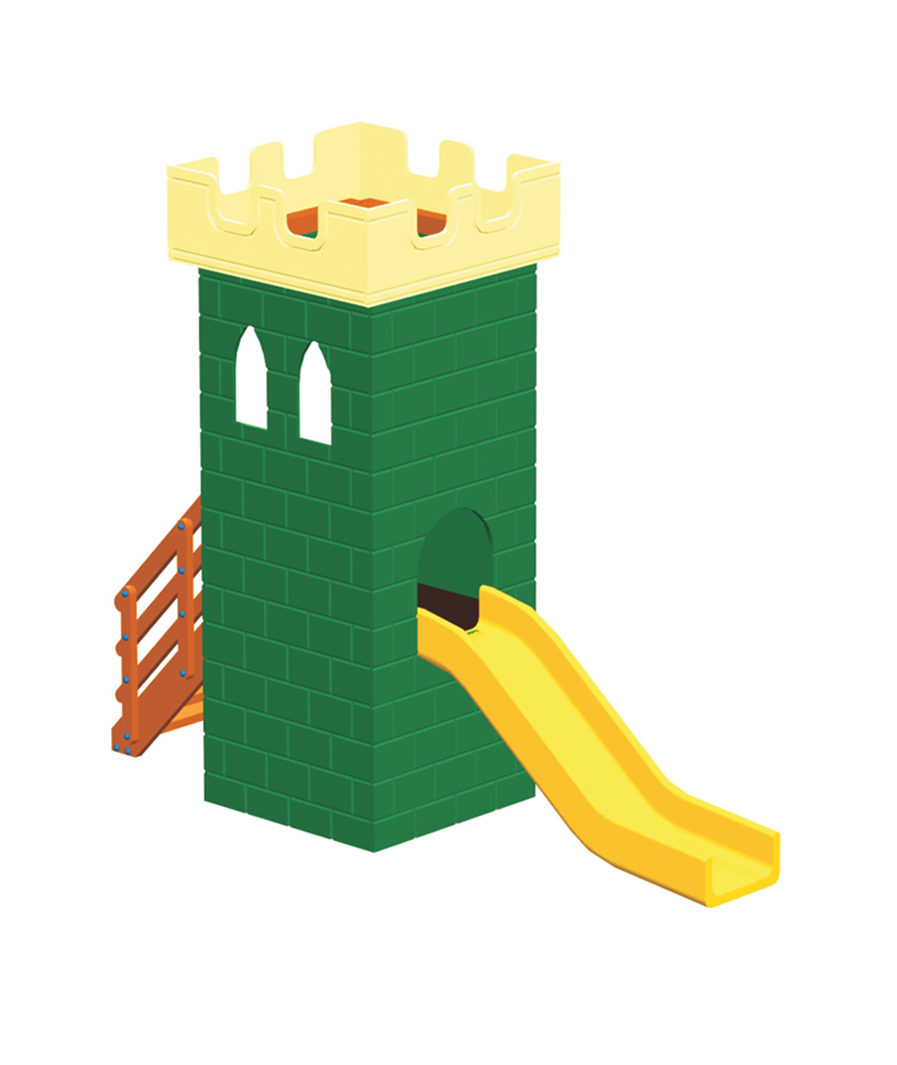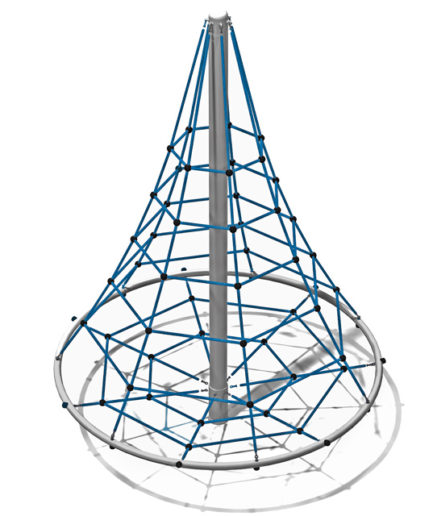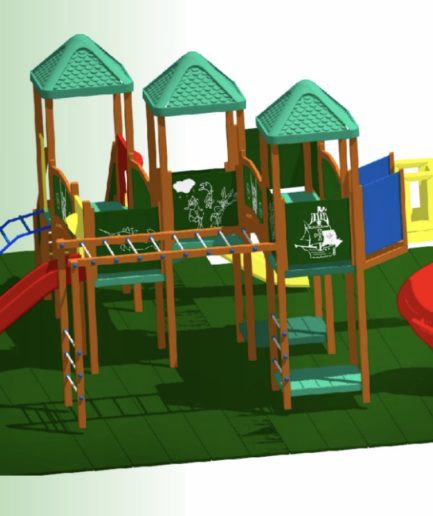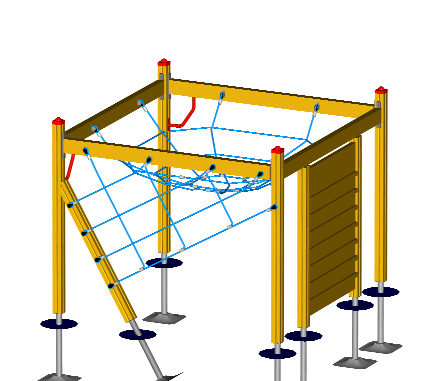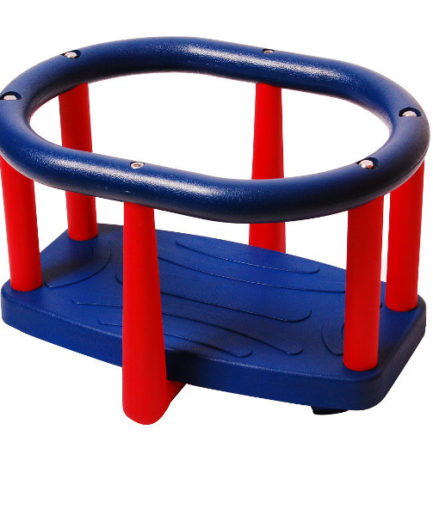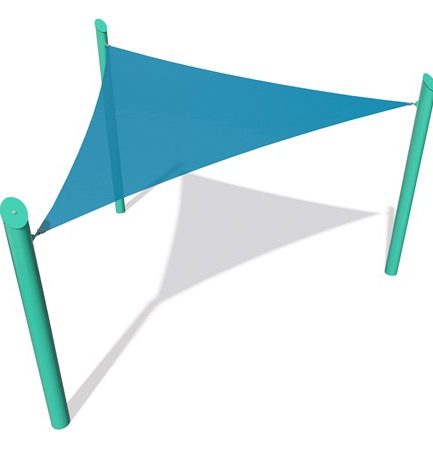CASTLE 1-122
The composite instrument has a total dimensions of 387×134 cm and a height of 302 cm and includes:
- 1 square loft 92 cm high
- 1 staircase for 92 cm loft
- 1 square cover
- 1 slide corrugated height 92 cm.
- Protective decorative castle-themed sides
SQUARE PATRIAR 92 cm (without cover)
The 92 cm loft has a total dimension of 111,5X111,5X203 cm and consists of:
- 2 wooden columns 9X9 cm and 200 cm high.
- 4 9x9x93,5 cm wood from which 4x4x93,5 cm length is removed.
- 1 Wireness Plywood, one side of which features a dark brown, non-slip floor. Its dimensions are 99X99 cm and its thickness is 21mm.
The 200 cm vertical wooden columns are pierced at 84.5 cm and 85.5 cm at each of the sides associated with the loft, from their base to the loft floor. These holes are fitted with metal beams Ø 15 mm with a length of 75 mm. It has two air-socket nuts at the corresponding height mounted on their wood hole. Fits with two 3 / 8X13 screws. The opening of the wood hole is sealed with a polypropylene (PP) plug.
The floor consists of 4 9x9x93.5cm woods, which support the wireness of the laminate flooring. At the top of the columns, polypropylene (PP) caps with polypropylene (PP) caps are dimensioned 95X95X60 mm and 4 mm thick with a 30 mm base with a hollow top.
STAIRCASE FOR THE LOFT 92 cm
The 92cm loft staircase measures 93X135cm and the projection length of the 92cm loft consists of:
- 2 wood 4.5,520×135 cm
- 4 wood 4,5x20x84,5 cm
- 4 wood 4,5x6x84,5 cm.
The 92cm staircase handrail consists of:
- 4 wood with curved edges 4,5x9x90 cm.
- 2 wood with curved edges 4,5x9x130 cm.
- 2 specially shaped rectangular birch plywood colored with internal angles of about 45 ° and 135 °, inscribed in a rectangular rectangle of approximately 110×200 cm, 2 cm thick.
Between the 2 x 20×135 cm woods are placed 4 4,5x6x84,5 cm woods per 20 cm. On these 4 4,5x20x84,5 cm woods are applied as presses.
The handrail is constructed as follows: The 2 woods 4.5x9x130cm are facing each other and facing upwards. In these, they are screwed vertically 4,5,5x9x90 cm 2 by 2 on each side. Between the 20x135cm stairs, 4,5x9x160cm stairs and the 4.5x9x90cm vertical stairs on each side of the staircase is covered with birch plywood.
STRAIGHT CORRUGATED SLIDE HEIGHT 92 cm.
The straight corrugated slide has a height of 92 cm and a length of 185 cm. It is manufactured by the molding rotary extraction method. It is formed of linear low density polyethylene with UV stabilizers and provides antistatic (static electricity) protection. Each color, which is non-toxic, is applied by rotary extraction of the mold. It is one-piece and also has a one-piece protective cover to prevent falls. These materials are disciplined by:
- ASTM – D – 790 (Flex Modulus – Flexible elements)
- ASTM – D – 638 (Tensile Strength)
- ASTM – D – 648 (Heat Distortion Temperature – Heated Distortion)
- ARM – STD (Low Temperature Impact – low temperature impact effect)
The wall diameter must be at least 6 mm in thickness. Exceptions should be mentioned.
ASTM = the American Society for Testing and Materials, the American Materials Testing and Testing Service
BACKPACK BASES
For fixing the instrument to the ground, each pair has a pair of mounting bases.
The mounting bases are made of two galvanized metal plates and then painted with electrostatic paint, of a shape “P” and approximately 100x12x4 cm thick and 0.5 cm thick, which “hug” the column and are joined together by passing screws 5 / 8 ″ X15. At the bottom there is a metal flange to hold them in the concrete pit.
Only ground irons, which hold the column at least 5 cm above the ground, are prevented from being ground in order to prevent the wood from being eroded by soil moisture.
TIMBER
The wood used is composite non-stick Swedish pine timber, in accordance with EN 351. It is manufactured with special compound (welding of wood) in different sections depending on the intended use.
COMPOSITE wood is 40% stronger than whole wood. It has a strength of 360 kp / m2 and a specific weight of about 480 kg / m3.
- Contains about 15% moisture
- Contains minimal juices (resin) compared to other pine family trees in other countries (weather in northern Sweden up to -25 ° C)
- Has thermal conductivity s = 0.10 Kcal / Mho and sound insulation 3.5 times greater than concrete or brick of equal thickness.
- It has antimagnetic properties and is a poor conductor of electricity
- Resistant to fire and classified in categories F30 and F60 (by DIN 4120) depending on its cross-section.
- When the outer part of the cross-section burns, its interior protects and retains its durability.
- It is processed just like commercial wood
- Maintains its shape and distorts or creates minimal fractures
- Annual wood rings are usually perpendicular to the long side of the cross-section with a significant increase in the mechanical strength of this surface, if applied to floors.
All corners of the wood are planed with a radius of about 5 mm.
COLORED PLYWOOD BIRCH
The plywood elements required for our constructions are approximately 20 mm thick and are made of 1.5 mm thick timber sheets bonded to each other by pressure-sealing using non-toxic phenolic base resins. They are painted with water-soluble paints to which no seals, thinners or paints containing lead, chromium, cadmium or other heavy metals have been attached. The colors are also very resistant to adverse weather conditions.
The above plywood sheets are in accordance with EN 314-2. The quality of the plywood is such that no further processing is required before painting, such as, for example, stocking, and reliefs and themes can be engraved.
PLASTIC ELEMENTS
The plastic components required to manufacture the equipment are highly resistant to UV radiation and adverse weather conditions. Preferred are recyclable materials such as polyethylene (PE) or polypropylene (PP). Specifically all screws protruding from the equipment over 5 mm are covered with polypropylene (PP) plastic plugs. They are also safe for the safety and health of children.
METALLIC ELEMENTS
The metallic elements used in the manufacture of the equipment (screws, joints, etc.) are made of metals either thermo-galvanized or electro-galvanized, where the surface preparation has been preceded by sandblasting or stainless steel. The dimensions and cross-sections of the metallic elements are sufficient to accommodate (with an appropriate safety factor) the loads for which they have been designed to withstand corrosion and adverse weather conditions.
PAINTS
The varnishes and colors that protect the wooden parts are specially designed for the climate of our country (temperature changes, open or closed areas etc.) are completely harmless to the users (they do not contain lead, chromium, cadmium and other heavy metals) ) and give great strength to our constructions.
For their anticorrosive protection, the metal parts of the mill are processed for polishing, followed by a coating of polyzinc (zinc) followed by a two-layer, electrostatic powder coating.
PACKING
The following procedure is used for fixing the equipment:
At this point where the column is to be placed, an 80 cm deep pit is opened. about 60cm in diameter. Then, after the column is inserted, the pit is filled with frusto-concreted concrete until it reaches 10 cm. from the ground surface, where it is covered with soil.
Only ground irons, which hold each column at a distance of about 10 cm from the ground, are prevented on the ground in order to prevent the wood from being corroded by soil moisture.
All production work processes for the processing of raw materials are carried out according to:
- EN 1176 standards 1-6,
- ISO 9001: 2015 quality system
- The ISO 14001: 2015 environmental management system

